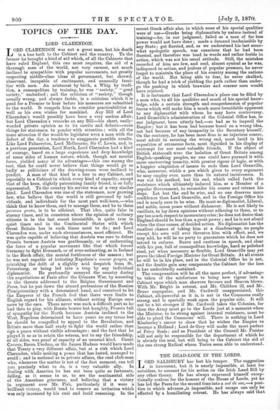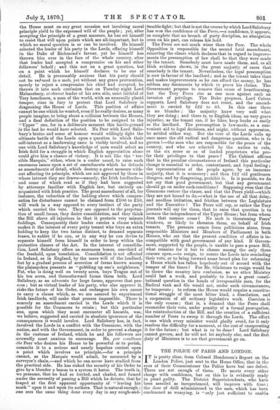THE DEAD-LOCK IN THE LORDS.
ORD SALISBURY has lost his temper. The suggestion A is irreverent, but it is nearly impossible, at least for outsiders, to account for his action on the Irish Land Bill by any other theory. He has always expressed himself excep- tionally zealous for the honour of the House of Lords, yet he has led the Peers for the second time into a cul de sac, —a posi- tion in which advance .is impossible, and escape can only be effected by a humiliating retreat. He has always said that the House must on any great occasion not involving moral principle yield to the expressed will of the people ; yet, after accepting the principle of a great measure, he has set himself to resist that will upon points which are all-important, but in which no moral question is or can be involved. He himself selected the leader of his party in the Lords, effacing himself An the Duke of Richmond's favour, yet he himself has thrown him over in the face of the whole country, after that leader had accepted a compromise on his and other followers' behalf ; and this not on a great question, but on a point which he himself declares to be one of detail. He is presumably anxious that his party should not be reheed to a mob, yet without any grave provocation, merely to reject a compromise his chief had accepted, he throws it into such confusion that on Tuesday night Lord Malmesbury, ci-devant leader of his own side, most faithful of Tory henchmen, a man of the world, with an unusually placid temper, rises in fury to protest that Lord Salisbury is dragooning the House of Lords. This position of affairs cannot be one which he wanted, even if he really desires, as many people imagine, to bring about a collision between the Houses, and a final definition of the position to be assigned to the " Upper " one, for in a deliberate moment this battle-ground As the last he would have selected. No Peer with Lord Salis- bury's brains and sense of honour would willingly fight the ultimate battle of the Lords upon a question in which their self-interest as a landowning caste is visibly involved, and no one with Lord Salisbury's knowledge of men would select an Irish field for a struggle in which English appreciation alone could give him a chance of victory, It is not like the "ter- rible Marquis," either, when in a cooler mood, to raise such enormous issues upon a set of amendments which he defends as amendments of detail, which destroy a great measure with- cut affecting its principle, which are not approved by those in whose interest they are drawn—namely, the Irish landlords- ' and some of which read as if they had been suggested by attorneys familiar with English law, but entirely un- acquainted with Irish practice. The great amendment of all, for instance, the reduction of the holding above which compen- sation for disturbance cannot be claimed from £100 to £50, will work in a way opposed to every instinct of the party which carried the vote. They are opposed to the perpetua- tion of small farms, they desire consolidation, and they think the Bill above all injurious in that it protects very minute holdings. Consequently their leader carries a clause which -makes it the interest of every petty tenant who buys an extra bolding to keep the two farms distinct, to demand separate leases, to sublet if he can, or in any way he can devise to separate himself from himself in order to keep within the protective clauses of the Act. In the interest of consolida- tion, Lord Salisbury offers an enormous bonus, one-third of the freehold, upon tesselation. Consolidation is not effected in Ireland, as in England, by the mere will of the landlord, but by a gradual process of accretion of farms known among the plainspoken peasants as "gobbling up one's neighbours," Pat, who is doing well on twenty acres, buys Teague out of his ten acres, and thenceforward farms them both. Lord Salisbury, as an advocate for large farms, approves that pro- cess; but as virtual leader of his party, who also approve it, risks the future of his Order, and endangers his own career to carry a clause which, as we are assured by experienced Irish landlords, will make that process impossible. There is scarcely an amendment carried in the Lords which it is possible for the Commons to retain ; but this particular .ene, upon which they must encounter all hazards, was, we believe, suggested and carried in absolute ignorance of the consequences it would involve. Lord Salisbury has, in fact, involved the Lords in a conflict with the Commons, with the nation, and with the Government, in order to prevent a change in the customs of Ireland, which he and his followers are Avowedly most anxious to encourage. He, par excellence .the Peer who desires his House to be powerful or to perish, commits it to a serious and nearly hopeless contest upon a point which involves no principle,—for a principle .cannot, as the Marquis would admit, be measured by a surveyor's chain,—and which he can never have studied from the practical side. He has risked the security of his Order to give by a blunder a bonus to a system it hates. The truth is, we presume, that he had so fretted, and chafed, and fumed .under the necessity of passing a Bill which he detests, that he leaped at the first apparent opportunity of "leaving his mark" upon it and upon its authors. That is natural enough ; one sees the same thing done every day in any rough-and-
bumble fight; but that is not the course by which Lord Salisbury has won the confidence of the Peers,—a confidence, it appears, so complete that no breach of party discipline, no abnegatioa even on his part, can release his hold.
The Peers are not much wiser than the Peer. The whole Opposition is responsible for the second fatal amendment, removing the clause which declares that in regard to improve- ments the presumption of law shall be that they were made by the tenant. Somebody must have made them, and, as all Irish evidence shows, in the great majority of cases that somebody is the tenant. Nevertheless, the legal presumption is now in favour of the landlord ; and as the tenant takes time and makes improvements as he can afford the money, he has seldom any documents by which to prove his claims. 'The Government propose to remove this cause of heartburning, but the Tory Peers rise as one man against such an invasion of privilege. The Duke proposes, Lord Cairns supports, Lord Salisbury does not resist, and the amend- ment is carried by 122 to 83. In this case there is no blunder ; the majority know very well what they are doing ; and there is, to English ideas, no very grave injustice, as the tenant can, if he likes, keep books as easily as the landlord. The presumption is law-made, as a con- venient aid to legal decisions, and might, without oppression, be settled either way. But the vote of the Lords calls up once more the old radical and dangerous question, who is to govern ?—the men who are responsible for the peace of the country, and who are selected by the nation to rule, or the six score or so of landed proprietors who pre- fer their privileges to that peace ? The Cabinet affirms that in the peculiar circumstances of Ireland this particular change is essential to order, contentment, and loyal feeling ; the representatives of the people agree, by an immense majority, that it is necessary ; and then 122 old gentlemen disagree, and by disagreeing, prohibit it. Is it possible, we do not say that good government, but that any government should go on under such conditions ? Supposing even that the Commons restore the clause, and that the Peers yield—which they are not bound to do,—what is the use of all that delay, and needless irritation, and friction between the Legislature and the Executive ? The Peers will say, or rather the Tory journals will say for them, that to raise that question is to menace the independence of the Upper House- but from whom does that menace come ? No mob is threatening Peers' windows, or likely to threaten them, on behalf of Irish tenants The pressure comes from politicians alone, from responsible Ministers and Members of Parliament in both Houses, who see that the present condition of affairs is in- compatible with good government of any kind. If Govern- ment, supported by the people, is unable to pass a peace Bill, what remains for it but to choose among the only three courses open,—to resign, to coerce the Lords into rescinding their vote, or to bring forward some broad plan for reforming a House which has fallen hopelessly out of accord with the temper of the times ? For Mr. Gladstone to resign would be to throw the country into confusion, as no other Ministry could last a week, and probably to leave a great consti- tutional question in the hands of irresponsible men, for the Radical rank and file would not, under such circumstances, be temperate ; to reform the House would require a constitu- tional struggle of the most bitter kind, a dissolution, and a suspension of all ordinary legislative work. Coercion is the only course ; that is, a demand that the Peers shall reconsider their vote, under penalty of a formal prorogation, the reintroduction of the Bill, and the creation of a sufficient number of Peers to sweep it through the Lords. The effort is one which every minister would gladly avoid, for it only resolves the difficulty for a moment, at the cost of exasperating it for the future ; but what is to be done ? Lord Salisbury cannot govern, and he will not let anybody else, and the first duty of Ministers is to see that government go on.































 Previous page
Previous page